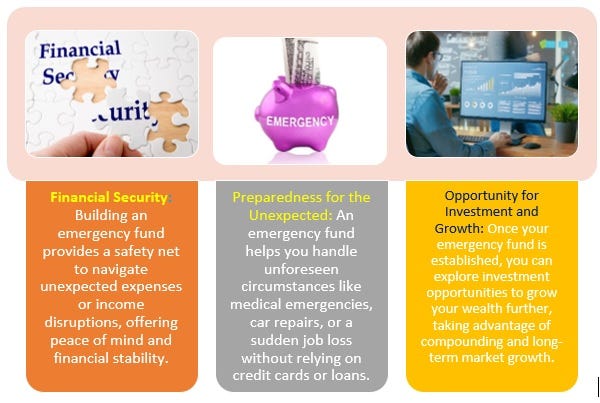When it comes to managing our finances, there is one aspect that is often overlooked or underestimated – the importance of having an emergency fund. Many of us may find it challenging to set aside money for unexpected expenses or emergencies, but I can personally attest to the peace of mind and financial security that it brings.
Growing up, my family often faced financial difficulties whenever unexpected events occurred. Whether it was a medical emergency, a sudden car repair, or a job loss, these unforeseen circumstances always left us scrambling to find the money needed to cover the expenses. It was a constant source of stress and anxiety, and it made me realize the significance of having a safety net in place.
An emergency fund acts as a buffer, providing us with a sense of financial security in times of uncertainty. It serves as a shield against the unexpected, giving us the peace of mind to navigate through life’s ups and downs without being constantly worried about our financial situation. In essence, having an emergency fund is like having a financial superhero watching out for us, ready to swoop in and save the day.
Now, you might be wondering, how much money should one have in an emergency fund? While there is no one-size-fits-all answer to this question, financial experts often recommend saving three to six months’ worth of living expenses. This amount provides a solid foundation for weathering most unforeseen circumstances, allowing you to cover essential costs such as rent or mortgage, utilities, groceries, and transportation.
Building an emergency fund requires discipline and consistency. It starts with setting aside a small portion of your income regularly, even if it’s just a few dollars each week. It may not seem like much at first, but over time, these small contributions add up and form a significant safety net. Automating your savings can be a great way to ensure that you consistently contribute to your emergency fund without even thinking about it.
A vital aspect of establishing an emergency fund is having it easily accessible when needed. While it’s essential to invest your savings to help them grow, emergency funds should typically be kept in liquid, easily accessible accounts like a savings account or a money market fund. This allows you to quickly access the money when unexpected expenses arise without having to worry about penalties or delays.
One common misconception about emergency funds is that they are only for unexpected financial crises. While they are undoubtedly crucial in times of job loss or medical emergencies, they can also be utilized for other life events that might require immediate financial attention. These may include home repairs, car repairs, a sudden family emergency, or even unexpected travel expenses.
One personal example that highlights the importance of an emergency fund was when my car broke down unexpectedly. At first, I panicked, realizing that the repair cost would be quite steep. However, thanks to my emergency fund, I was able to cover the repairs without having to rely on credit cards or loans. This not only saved me from the stress of accumulating debt but also prevented any long-term financial repercussions.
Having an emergency fund not only provides a sense of security but can also save us money in the long run. Without an emergency fund, we might be forced to turn to high-interest credit cards or take out loans to cover unforeseen expenses. This can lead to a cycle of debt and further financial strain. By having an emergency fund to rely on, we can avoid accumulating debt and the associated costs that come with it.
Another aspect to consider is that emergencies don’t discriminate. They can happen to anyone, regardless of age, income, or employment status. By having an emergency fund, we are better prepared to face whatever life throws at us. It allows us to navigate through unexpected situations without disrupting our financial stability or resorting to drastic measures.
In addition to providing financial security, an emergency fund can also alleviate mental and emotional stress. Financial worries can take a toll on our overall well-being, impacting not only our mental health but also our relationships and productivity. Knowing that you have a financial safety net can help reduce anxiety and provide a sense of control during difficult times.
In conclusion, an emergency fund plays a pivotal role in our financial wellness. It serves as a lifeline, protecting us from the unexpected and giving us the peace of mind to face whatever challenges come our way. By establishing a disciplined savings plan and consistently contributing to our emergency fund, we can safeguard ourselves against financial uncertainty and secure a brighter future for ourselves and our loved ones. So, let’s start building our financial safety net and embrace the peace of mind that comes with true financial security.
